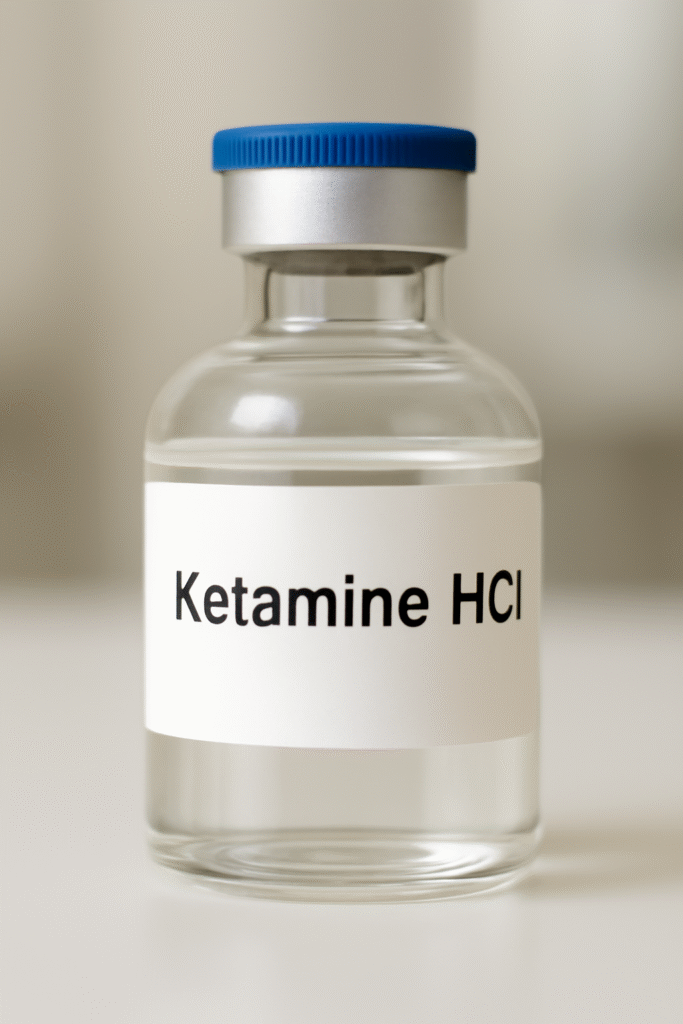Ketamine (ketamine hydrochloride) was originally used as an anesthetic but is now showing promise as a treatment for depression, post-traumatic stress disorder (PTSD), and chronic pain when used in a clinical setting.
If you’re considering ketamine or esketamine treatment, you might be wondering how quickly it works, how long effects last, and how long it stays in the body. To help you understand what to expect, we answer all these questions and more in the below article.
When is ketamine used in a clinical setting?
Ketamine is often used when other options haven’t worked or a patient needs quick relief. It’s most commonly used to treat:
- Treatment-resistant depression (TRD): Ketamine can provide relief for people whose depression symptoms haven’t improved with antidepressants or therapy
- Major depression with suicidal thoughts: Because ketamine acts quickly, it can be used to reduce suicidal ideation while a patient waits for other medication to start working
- Post-traumatic stress disorder (PTSD): Studies suggest that ketamine may reduce flashbacks, intrusive thoughts, and emotional pain tied to past trauma
- Chronic pain: When taken at lower doses, ketamine can help manage long-term pain conditions like fibromyalgia.
How is ketamine administered?
Ketamine is only administered in safe, medical settings under careful supervision. It’s most commonly administered via intravenous (IV) infusions and intramuscular (IM) injections. There is also an FDA-approved nasal spray called Spravato®, which is made from a derivative of ketamine called esketamine.
What is esketamine?
Esketamine is a nasal spray form of ketamine sold under the brand name Spravato®. It’s FDA-approved for people who have tried at least two antidepressants without relief (known as treatment-resistant depression).
Like other forms of ketamine, esketamine is only administered in a clinic under medical supervision. It was initially only prescribed alongside an oral antidepressant, however this is no longer mandatory and patients can now use the medication on its own, depending on their treatment history.
Spravato® treatment follows a structured dosage schedule:
- Weeks 1-4: Twice a week
- Weeks 5-8: Once a week
- Weeks 9+: Once every 1-2 weeks.
Each Spravato® session takes place in a clinical setting where patients are monitored for at least two hours. This observation period is important, since it’s common to experience side effects like dizziness, sleepiness, or short-term memory loss and concentration issues.
Learn more about Spravato® and how it can help treat depression here.
How long does it take for ketamine to work?
Ketamine acts faster than most medications. IV infusions can take effect within seconds while IM injections usually begin working within four minutes. Its noticeable effects, like relaxation and pain relief, can last between 15 to 30 minutes depending on the ketamine dose and method of administration.
When used recreationally (by snorting, smoking, or swallowing), ketamine’s effects can last even longer – up to 30 to 60 minutes – and include distorted perceptions and dissociation. But you won’t experience these dissociative effects at the same intensity when you take ketamine at therapeutic doses.
What is the half-life of ketamine?
Even though ketamine’s immediate effects fade quickly, the drug itself can remain in the body for longer. Its half-life (the time it takes for half of the drug to be cleared from the system) is usually 2.5 to 3 hours for adults.
It generally takes about four to five half-lives (around 10 to 15 hours) for ketamine to be completely eliminated from the body. That said, how long it stays in the system depends on several factors, including a person’s age, health, metabolism, and more – we cover these factors later in the article.
Does ketamine show up on drug tests?
Yes, ketamine can be detected on a drug test, but it’s not usually included in routine drug screenings. Most standard panels used by employers or healthcare providers only check for substances like cannabis, opioids, cocaine, amphetamines, and benzodiazepines.
That said, there are specialized drug tests that specifically look for ketamine. These can detect ketamine itself as well as its byproducts (norketamine and dehydronorketamine) in blood or urine samples.
If you’re using ketamine as part of medical treatment, it’s important to be upfront with your employers or whoever is conducting the drug test. Let them know that you’re taking ketamine as a medical treatment and, if possible, ask your healthcare provider to provide documentation.
How is ketamine detected on drug tests?
The most common way to test for ketamine in a drug test is through a urine sample. Even though ketamine clears from urine in around 24 hours, its metabolites (breakdown products) stay in the system for much longer. For example, norketamine has been detected in urine for up to two weeks after a single IV dose.
There are different ways you can test for ketamine, including:
- Urine tests: These are the standard option and able to pick up on ketamine and its metabolites for days or even weeks after use.
- Saliva & blood tests: These are less common but can show ketamine use for about 1 to 3 days after use.
- Hair tests: These can show traces of ketamine and its metabolites for up to 90 days after use, but they’re rarely used in employment screening.
How long does ketamine stay in your system?
The noticeable effects of ketamine usually fade within 30 to 60 minutes, but the drug and its metabolites can linger in the body for much longer. To understand how this works, let’s go into a bit more detail about how the body processes ketamine.
When you take ketamine, either through an IV or IM injection, the liver breaks it down into byproducts like norketamine and dehydronorketamine. Most of these byproducts (also called metabolites) are flushed out through urine and a small amount leaves the body through the breath.
Most healthy adult bodies will fully process and eliminate ketamine from the body within 10 to 15 hours. That said, drug tests can still pick up on tiny residual traces in body tissues beyond that time.
Depending on the type of test, it’s estimated that ketamine can be detected:
- Up to 48 hours in saliva
- For 1-3 days in the blood
- For several days, sometimes up to 2 weeks, in urine
- Up to 90 days in hair follicles (with traces showing up about a week after use).
Remember, everybody is different and ketamine detection times will vary widely depending on the individual. It’s also worth noting that therapeutic doses of ketamine are carefully managed, so the drug might clear faster compared to recreational or high-dose usage.
What affects how long ketamine stays in the body?
There are several factors that can affect how long ketamine stays in the body:
- Dosage: Larger doses will naturally take longer for the body to process and eliminate.
- Frequency of use: Ketamine clears faster when used occasionally. The more frequently you use ketamine, the longer it will take to clear from your system since the drug and its metabolites will build up in the body.
- Method of use: The way that you take ketamine (i.e. intravenously, intramuscularly, orally, or intranasally) can also affect how long it takes for the body to eliminate it.
- Metabolism: People with naturally faster metabolisms are likely to process and eliminate ketamine more quickly.
- Liver & kidney function: Ketamine is mainly processed by the liver and excreted through the kidneys, so if you have impairments in these organs it might take longer to process the drug.
- Hydration: Since ketamine mostly leaves the body through the urine, staying hydrated might help flush the drug and its metabolites from the system faster.
- Body mass: People with a larger body mass might be able to process and eliminate ketamine faster, although this depends on how the body stores and distributes the drug.
- Overall health: People in general good health might process ketamine faster than those with health conditions, especially those that affect the kidneys, liver, or metabolism.
- Mixing with other drugs: When ketamine is taken alongside other substances, it can compete for the body’s metabolic resources and slow down elimination.
Does ketamine have withdrawal symptoms?
This depends on how ketamine is taken. When used in a clinical setting under medical supervision, ketamine is given in highly controlled doses to help reduce the risk of physical dependence on withdrawal.
But when taken frequently or at high doses, like in recreational situations, ketamine can sometimes cause withdrawal symptoms if a person stops taking it suddenly. These symptoms aren’t usually physical, like with alcohol or opioids, but more psychological.
Some common ketamine withdrawal symptoms include:
- Cravings for ketamine
- Anxiety or restlessness
- Low energy or fatigue
- Irritability and mood swings
- Difficulty sleeping
- Trouble with concentration or memory
According to the Drug Enforcement Administration (DEA), ketamine has the potential for abuse. If you are worried about ketamine addiction or psychological dependence, don’t be afraid to reach out for help. You can contact the Substance Abuse and Mental Health Services Administration’s (SAMHSA) National Helpline at 1-800-662-HELP (4357) for advice on substance abuse treatment and mental health referrals.
Summary: How long does ketamine last in your body?
When used in the right setting, ketamine can be a life-changing treatment for depression, PTSD, and chronic pain. We offer esketamine (Spravato®) for treatment-resistant depression at our Psychiatry Treatment Centers in Los Angeles and throughout Georgia.
If you have any questions about this treatment, or would like to explore your eligibility, don’t hesitate to contact our team today. We’ll be happy to provide guidance and support you on your journey to mental well-being.

